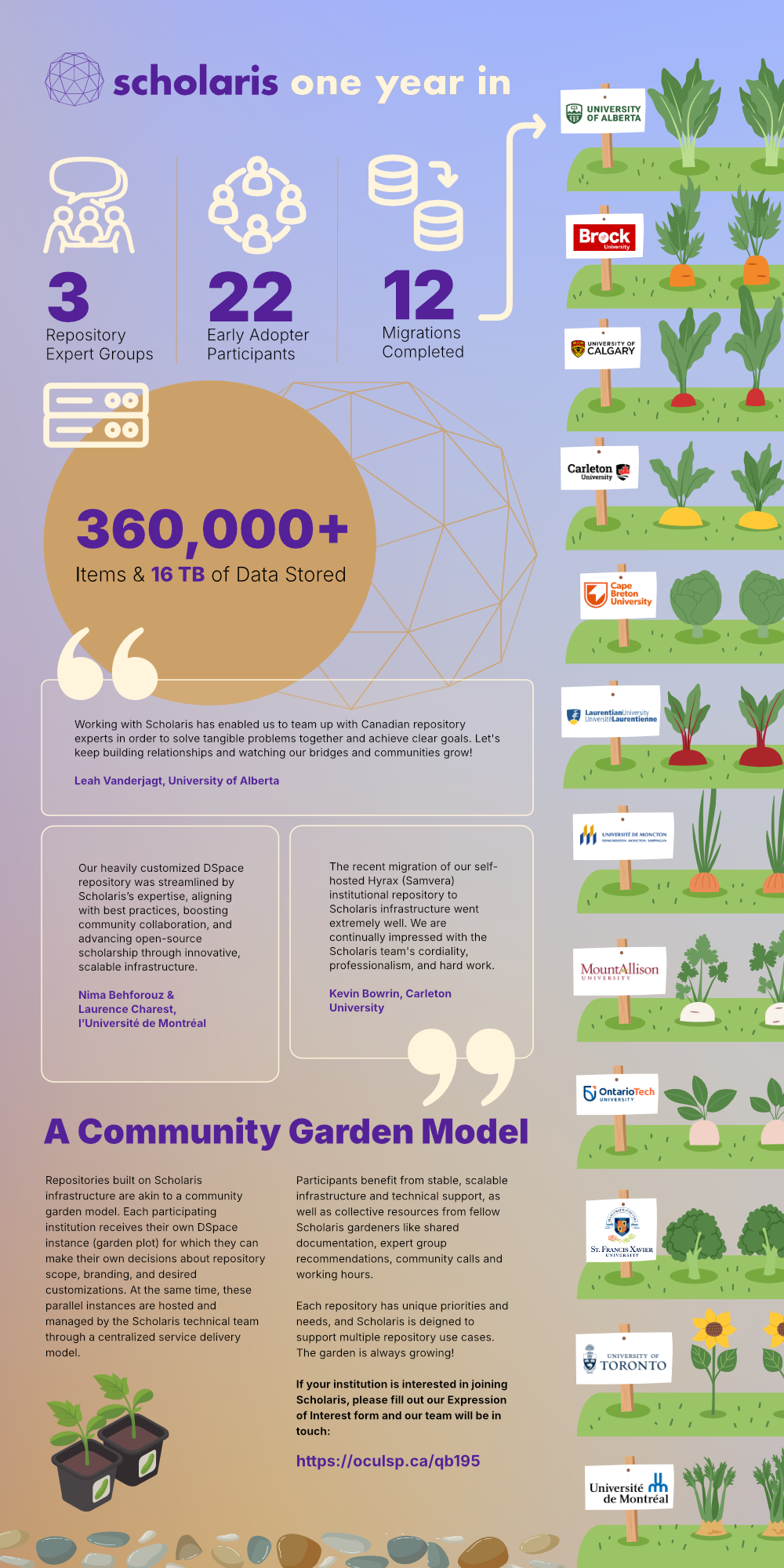It’s been a busy and exciting first year for the Scholaris service! As we reflect on the Scholaris Early Adopter Program and the Scholaris Network of Experts, we’re celebrating the progress accomplished in this short period.
Most importantly, thank you to all who have contributed to the ongoing development of a community-driven model and robust technical infrastructure for a national shared institutional repository service. As we blow out the candles, here are some of the highlights from our first year:

Scholaris Early Adopter Program
Launched in April 2024, the two-year cohort-based program is open to Canadian academic institutions of all sizes, representing a wide range of repository use cases and migration scenarios. The goals of the Early Adopter Program are to migrate participating institutions to DSpace, establish efficient workflows for migration and ongoing service delivery, and define the service offering and pricing model. Through this process, the Scholaris team will gain an understanding of what is needed to support Canadian IRs from a service perspective. Learn more about the Early Adopter Program.
Over the course of this first year, the Scholaris team has migrated institutions from various versions of DSpace and from non-DSpace platforms, set up new repositories, upgraded all instances to DSpace 7.6.3 and contributed code back to the DSpace community. We’ve worked closely with our Early Adopters to apply customizations and integrations, including external authentication methods and DOI registration via the DataCite API, and hosted regular calls to collaborate on service development, share knowledge, and learn alongside one another. The expertise, diligence, and responsiveness of the Scholaris technical team, particularly Mohana Sarmiento and Rachel Wang, have been essential to these efforts, ensuring a smooth migration and a positive ongoing service experience for Early Adopters.
At the midway point of the program, we have 22 participating institutions in phased migrations. Over half of the participants are live on their Scholaris instances, with more expected to launch in the coming weeks and months. We’re grateful to our Early Adopters for their input, enthusiasm, and feedback - thank you for embarking on this journey with us!
Applications for the Early Adopter Program are open for onboarding starting between fall 2025 and spring 2026. If your institution is interested in joining the program or if you have questions about the service, we’d love to hear from you! Contact us at info@scholaris.ca.
Scholaris Network of Expert Groups
Coordinated by the Canadian Association of Research Libraries (CARL), the Scholaris Network of Expert Groups offer guidance and support on key areas of the service. The Scholaris Metadata and Discovery Expert Group (S-MDEG) and the Scholaris Electronic Theses and Dissertations Expert Group (S-ETEG) launched in spring 2024, followed by the Scholaris Digital Preservation Expert Group (S-DPEG) in the summer. Over the last year, these groups met regularly to assess the current Canadian repository landscape, identify service considerations, and prepare thoughtful recommendations that support not only Early Adopters and the Scholaris service team, but the wider repository community.
You can view some of the impressive outputs of these groups in TSpace, with more to follow in the coming months. We are grateful to the members and the CARL Visiting Program Officer for Scholaris, Gabriela Mircea, for contributing their time, insights, and expertise to build greater alignment within the Canadian repository community. Thank you!
The future is bright!
Scholaris is not just about delivering the technical components - developing community infrastructure is a key component to building a collaborative, sustainable, and dynamic service. Engaging with Early Adopters, expert groups, and repository community members networks over the past year has helped deepen our understanding of what is needed and valued in a shared repository service. These insights have shaped both the technical infrastructure and how we approach service delivery.
Looking ahead, we’re planning an upgrade to DSpace 8 later this year, along with supporting Early Adopters in the implementation of Configurable Entities, new features and integrations, developing flexible workflows for digital preservation, and becoming more deeply involved in the DSpace community. The expert groups will continue their valuable work over the next year and we continue to hold monthly community calls for Early Adopters and information sessions for the wider repository community.
As Scholaris grows, we are immensely grateful to everyone who has joined us in this endeavour, and we look forward to many more successful migrations, to welcoming new Early Adopters, and to continue learning together.
About Scholaris
Scholaris is an opt-in national shared repository service being developed by the Canadian Association of Research Libraries (CARL), the Ontario Council of University Libraries (OCUL) and the University of Toronto Libraries (UTL), in collaboration with the Shared Repository Infrastructure Advisory Committee (SRIAC), regional consortia, academic libraries, repository practitioners and communities of experts. The shared technical infrastructure, which includes hosting and managing parallel instances of DSpace repository software, is delivered by Scholars Portal.